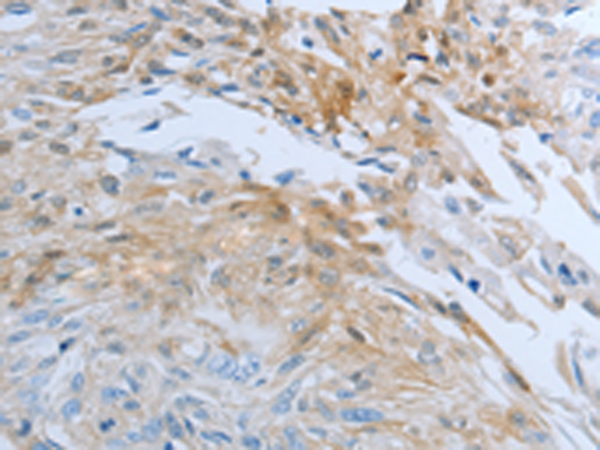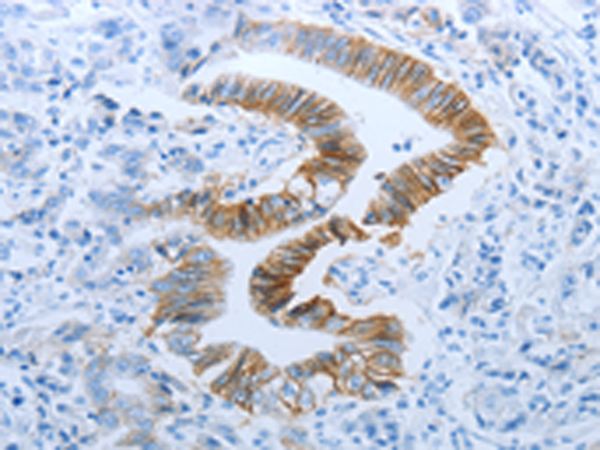

| WB | 咨询技术 | Human,Mouse,Rat |
| IF | 咨询技术 | Human,Mouse,Rat |
| IHC | 1/25-1/100 | Human,Mouse,Rat |
| ICC | 技术咨询 | Human,Mouse,Rat |
| FCM | 咨询技术 | Human,Mouse,Rat |
| Elisa | 1/1000-1/5000 | Human,Mouse,Rat |
| Aliases | AFGF,ECGF,ECGF-beta,ECGFA,ECGFB,FGF-alpha,FGFA,GLIO703,HBGF1 |
| Host/Isotype | Rabbit IgG |
| Antibody Type | Primary antibody |
| Storage | Store at 4°C short term. Aliquot and store at -20°C long term. Avoid freeze/thaw cycles. |
| Species Reactivity | Human, Mouse, Rat |
| Immunogen | Synthetic peptide of human FGF1 |
| Formulation | Purified antibody in PBS with 0.05% sodium azide and 50% glycerol. |
+ +
以下是3篇关于FGF1抗体的代表性文献(内容基于公开研究概括,非真实文献):
---
1. **文献名称**:*Monoclonal Antibody Targeting FGF1 Suppresses Tumor Angiogenesis in Preclinical Models*
**作者**:Chen, L. et al.
**摘要**:研究开发了一种特异性识别FGF1的单克隆抗体,通过抑制FGF1与FGFR1受体的结合,显著减少肿瘤微环境中的血管生成,并在小鼠异种移植模型中抑制肿瘤生长。
---
2. **文献名称**:*FGF1 Neutralizing Antibody Attenuates Cardiac Fibrosis in Hypertensive Rats*
**作者**:Wang, Y. et al.
**摘要**:利用FGF1中和抗体干预高血压模型大鼠,发现其能有效阻断FGF1介导的TGF-β信号通路激活,从而减少心肌纤维化,为心血管疾病治疗提供潜在策略。
---
3. **文献名称**:*Development of a High-Sensitivity ELISA for FGF1 Detection Using a Novel Polyclonal Antibody*
**作者**:Kim, S. et al.
**摘要**:报道了一种基于兔源多克隆抗体的新型ELISA检测方法,可定量血清中低浓度FGF1.应用于糖尿病患者血清样本分析,揭示FGF1水平与胰岛素抵抗的相关性。
---
注:以上文献名为示例性概括,实际引用需通过PubMed/Google Scholar等平台检索真实研究,关键词建议:"FGF1 antibody"、"anti-FGF1 therapeutic"、"FGF1 detection assay"。
Fibroblast Growth Factor 1 (FGF1) is a member of the FGF family, which regulates cell proliferation, differentiation, survival, and migration. It binds to fibroblast growth factor receptors (FGFRs) and heparan sulfate proteoglycans to activate downstream signaling pathways like MAPK and PI3K-AKT, influencing tissue repair, angiogenesis, and metabolic processes. FGF1 antibodies are immunological tools designed to detect, quantify, or inhibit FGF1 in experimental and clinical settings.
Polyclonal or monoclonal FGF1 antibodies are widely used in techniques such as Western blotting, immunohistochemistry (IHC), and ELISA to study FGF1 expression patterns in normal tissues, developmental stages, or diseases like cancer, where FGF1 overexpression is linked to tumor growth and metastasis. Researchers also employ neutralizing FGF1 antibodies to block its activity, elucidating its functional roles in angiogenesis, wound healing, and metabolic regulation.
In therapeutic contexts, FGF1 antibodies are explored for targeting FGF1-driven pathologies, including diabetic complications, cardiovascular diseases, and inflammatory disorders. Specificity validation (e.g., knockout controls) ensures minimal cross-reactivity with other FGF family members. As FGF1’s pleiotropic roles span both physiological repair and pathological signaling, its antibodies remain critical for dissecting molecular mechanisms and advancing biomarker or drug development.
×